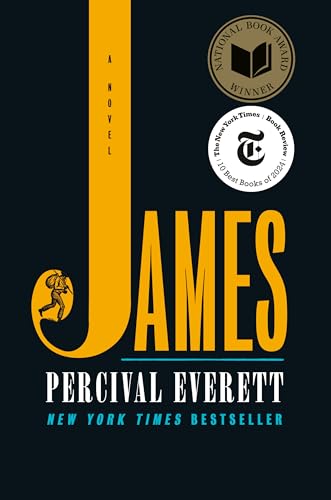James
A brilliant, action-packed reimagining of Adventures of Huckleberry Finn, both harrowing and ferociously funny, told from the enslaved Jim's point of view. - From the "literary icon" (Oprah Daily), Pulitzer Prize Finalist, and one of the most decorated writers of our lifetime
When the enslaved Jim overhears that he is about to be sold to a man in New Orleans, separated from his wife and daughter forever, he decides to hide on nearby Jackson Island until he can formulate a plan. Meanwhile, Huck Finn has faked his own death to escape his violent father, recently returned to town. As all readers of American literature know, thus begins the dangerous and transcendent journey by raft down the Mississippi River toward the elusive and too-often-unreliable promise of the Free States and beyond.
While many narrative set pieces of Adventures of Huckleberry Finn remain in place (floods and storms, stumbling across both unexpected death and unexpected treasure in the myriad stopping points along the river's banks, encountering the scam artists posing as the Duke and Dauphin...), Jim's agency, intelligence and compassion are shown in a radically new light.
Brimming with the electrifying humor and lacerating observations that have made Everett a "literary icon" (Oprah Daily), and one of the most decorated writers of our lifetime, James is destined to be a major publishing event and a cornerstone of twenty-first century American literature.
These book club questions are from the publisher, Penguin Random House.
Book club questions for James by Percival Everett
Use these discussion questions to guide your next book club meeting.
James is a retelling of Mark Twain’s 1885 novel Adventures of Huckleberry Finn, which is widely regarded as a classic work of American literature. Have you read Adventures of Huckleberry Finn before? How does Everett subvert Twain’s original text? Did this reimagination change your perspective on the original novel?
Twain is well-known for his satirical writing. Where does Everett use humor and satire in James? What social and cultural conditions does the novel’s satire mock or critique?
Reflect on Jim’s narration. Why does he switch between vernacular and standardized English? How did this code-switching affect your reading experience?
Describe Huck’s role in the story. How does Jim’s fugitive status, as well as race, color, class, age, and education, influence the relationship between the two characters?
James depicts the brutalities of slavery, particularly the violence inflicted upon enslaved women and girls, through the stories of Sadie, Lizzie, Sammy, and Katie. What are the unique threats that these characters must navigate? How does Jim react to the gendered violence that he encounters?
Return to Jim’s travels with the minstrel group. What does the novel say about the performance of race? How do blackface minstrelsy and racial passing complicate or undermine racial classification? Can all the characters be seen as performers of race?
Jim’s quest for freedom parallels his quest for literacy. Discuss the key moments on his journey to writing his story. What are the texts that he studies? Who are the characters who give him the tools and encouragement to write?
James references author William Wells Browning, composer Daniel Decatur Emmett, and philosophers John Locke, Jean-Jacques Rousseau, and Voltaire. Consider researching these figures. How do they influence your understanding of the historical period?
Discuss the use of religion and superstition in the story.
Were you surprised by Jim’s revelation in chapter one of part three? Returning to earlier passages, can you identify any moments of foreshadowing from Everett? How would you characterize Huck’s reaction? Have you ever learned something shocking about your family’s history?
James features an ensemble of fugitive and enslaved characters. How does Everett affirm the humanity of these characters in his writing? Was there one who was particularly memorable to you?
The Mississippi River is central to the landscape of the novel. What is the role of the river? How did it shape the political landscape of the region and the events of the novel?
Reflect on the title, James. What’s the significance of Jim renaming himself? Why do you think Everett chose to title the novel in this way?
What was your reaction to the novel’s ending? What do you think the future holds for James and his family?
After reading James, can you think of another character from a classic text that you would like to read as the narrator of their own story?
James Book Club Questions PDF
Click here for a printable PDF of the James discussion questions

